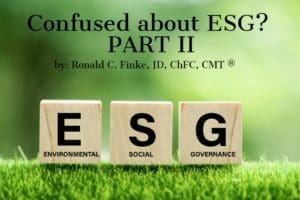 The promises of ESG do not match the performance
The promises of ESG do not match the performance
Ours is a world of paradox. Things like facts you recently thought were settled long ago are now suspect or judged to be incorrect based upon eyes of the beholders. (We will not dwell upon the fact that the most recently confirmed Justice of the Supreme Court confidently testified that she does not know what constitutes a woman.)
A few weeks ago, I wrote about the background and emergence of investing in companies that are considered preferable and more valuable to the world. Why? The powers that be or wannabe (including governments and non-governmental organizations like the World Economic Forum) want to encourage their supposed positive effects on the environment and societies in general through enlightened corporate governance relative to the average public corporations.
McKinsey & Co. is one of the firms of business strategic experts that advised American business to move production to Asia over past decades. In an article of August, 2022, its writers opine that a company that does not pay enough attention to externalities—everything else but providing the best goods and services to its customers at fair prices—will not be likely to sustain its business because it will lose its social license. Is that a threat or a prediction, or both?
Social license is defined as the perception by stakeholders that a business or industry is acting in a way that is fair, appropriate, and deserving of trust. Stakeholders are those outsiders who believe they deserve to run your company despite the fact they have no or little skin in the game or do not want to risk the responsibilities of ownership.
Yes, of course I am editorializing, but consider social license as a double-edged sword. There may come a time not too long from now when thinking parents will decide that Disney no longer deserves the social license built by Walt Disney over decades of careful stewardship.
The University of Colorado Provost Professor of Finance, Sanjai Bhagat, wrote about An Inconvenient Truth About ESG Investing in March, 2022, in the Harvard Business Review. You may find it at https://hbr.org/2022/03/an-inconvenient-truth-about-esg-investing
In his writings, he cites the research of a number of not-so-reactionary enclaves such as Columbia University, the Universities of Chicago, Northern Iowa, and South Carolina, The London School of Economics and the European Corporate Governance Institute. He concludes ESG funds certainly perform poorly in financial terms. He then discusses the finding from Morningstar reports that the funds rated highest in terms of ESG investing did not even compete well with the lowest rated funds of the regular or non-ESG funds.
Furthermore, two of the most prestigious schools’ research indicated that companies listed in the ESG funds also had worse records of compliance with labor and environmental rules. Insult added to financial injury in my opinion.
Unfortunately, as I began above, we live in an era in which we must look under the hood, the surface, or any other cover to find out what is true and important. This should be no surprise since we know that one should always follow the money. Kinsey & Co. is available and anxious to consult with you about how best to prove your ESG bona fides, for a fat fee.
(Past performance is no guarantee of future results. The advice is general in nature and not intended for specific situations)
